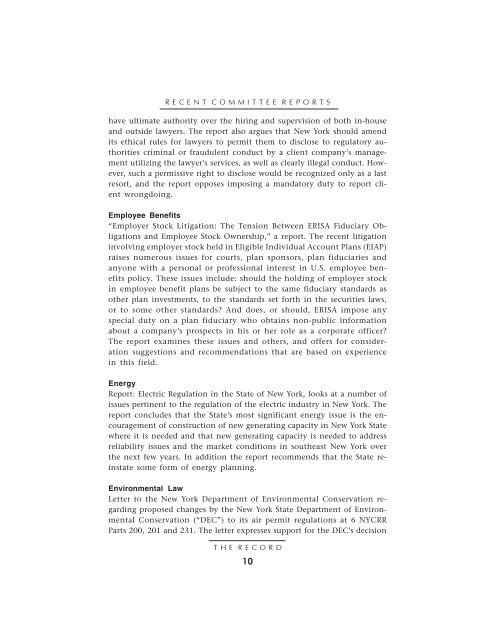2007 Issue 1 - New York City Bar Association
2007 Issue 1 - New York City Bar Association
2007 Issue 1 - New York City Bar Association
Create successful ePaper yourself
Turn your PDF publications into a flip-book with our unique Google optimized e-Paper software.
R E C E N T C O M M I T T E E R E P O R T S<br />
have ultimate authority over the hiring and supervision of both in-house<br />
and outside lawyers. The report also argues that <strong>New</strong> <strong>York</strong> should amend<br />
its ethical rules for lawyers to permit them to disclose to regulatory authorities<br />
criminal or fraudulent conduct by a client company’s management<br />
utilizing the lawyer’s services, as well as clearly illegal conduct. However,<br />
such a permissive right to disclose would be recognized only as a last<br />
resort, and the report opposes imposing a mandatory duty to report client<br />
wrongdoing.<br />
Employee Benefits<br />
“Employer Stock Litigation: The Tension Between ERISA Fiduciary Obligations<br />
and Employee Stock Ownership,” a report. The recent litigation<br />
involving employer stock held in Eligible Individual Account Plans (EIAP)<br />
raises numerous issues for courts, plan sponsors, plan fiduciaries and<br />
anyone with a personal or professional interest in U.S. employee benefits<br />
policy. These issues include: should the holding of employer stock<br />
in employee benefit plans be subject to the same fiduciary standards as<br />
other plan investments, to the standards set forth in the securities laws,<br />
or to some other standards And does, or should, ERISA impose any<br />
special duty on a plan fiduciary who obtains non-public information<br />
about a company’s prospects in his or her role as a corporate officer<br />
The report examines these issues and others, and offers for consideration<br />
suggestions and recommendations that are based on experience<br />
in this field.<br />
Energy<br />
Report: Electric Regulation in the State of <strong>New</strong> <strong>York</strong>, looks at a number of<br />
issues pertinent to the regulation of the electric industry in <strong>New</strong> <strong>York</strong>. The<br />
report concludes that the State’s most significant energy issue is the encouragement<br />
of construction of new generating capacity in <strong>New</strong> <strong>York</strong> State<br />
where it is needed and that new generating capacity is needed to address<br />
reliability issues and the market conditions in southeast <strong>New</strong> <strong>York</strong> over<br />
the next few years. In addition the report recommends that the State reinstate<br />
some form of energy planning.<br />
Environmental Law<br />
Letter to the <strong>New</strong> <strong>York</strong> Department of Environmental Conservation regarding<br />
proposed changes by the <strong>New</strong> <strong>York</strong> State Department of Environmental<br />
Conservation (“DEC”) to its air permit regulations at 6 NYCRR<br />
Parts 200, 201 and 231. The letter expresses support for the DEC’s decision<br />
T H E R E C O R D<br />
10

















